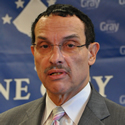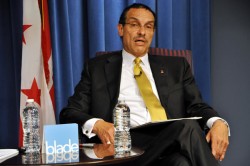Local
Gray board appointee called gays ‘faggots’
Local activists divided over decision to name Leroy Thorpe to post


Mayor Vincent Gray’s decision to appoint a controversial civic leader to a mayoral advisory committee has rankled some. (Blade file photo by Michael Key)
Gay activists had mixed views this week over a decision by Mayor Vincent Gray to appoint a controversial civic leader who in past years referred to gays as “faggots” to a mayoral advisory committee that looks at city programs to curtail juvenile delinquency.
Gray last week named Leroy Thorpe, a licensed social worker and counselor with the D.C. Department of Youth Rehabilitation Services and a longtime civic activist in the city’s Shaw neighborhood, to the mayor’s Juvenile Justice Advisory Group. The unpaid advisory panel assists the mayor and DYRS, among other things, on how to use federal funds to strengthen the city’s juvenile justice system.
D.C. Council member Jack Evans (D-Ward 2), a longtime supporter of LGBT rights, sent Gray a letter strongly recommending Thorpe for the appointment.
Evans could not be immediately reached for comment.
And Ron Collins, Gray’s gay director of the Mayor’s Office of Boards and Commissions, said he vetted Thorpe for the appointment and recommended that the mayor name him to the advisory panel. Collins said Thorpe’s background and experience on juvenile justice issues showed him to be qualified for the post.
“I’ve known Leroy Thorpe for a number of years and I really don’t feel that he is a bigot toward any community,” Collins told the Blade.
Thorpe told the Blade in a phone message on Monday that he prefers not to discuss things he said in the past but said he’s changed his views and treats all people with respect.
“These days, you know, I got older, got wiser,” he said. “And I don’t act like I did before, back in the time when…I spoke without thinking. Everybody deserves respect and I don’t care who or what you are.”
Martin Moulton, president of the Convention Center Community Association, a Shaw-based group that has long been at odds with Thorpe, says Thorpe’s “history of bigotry” makes him unsuitable for a mayoral appointment.
In a series of e-mails sent to public officials and gay activists, Moulton points to statements Thorpe has made about gays on at least two occasions over the past 20 years. One took place in 1991, when Thorpe shouted through a bullhorn at a polling station on Election Day that gay City Council candidate Jim Zais was a “faggot” and Shaw voters should not support him.
Zais, who died of AIDS in 1994, lost the election to Evans by a close margin. At the time, Evans and his supporters disavowed Thorpe’s characterization of Zais, saying he wasn’t representing Evans or the Evans campaign.
Moulton noted that Thorpe several years ago called gay D.C. Council member David Catania (I-At-Large) an anti-gay name during a City Council hearing.
According to Moulton, Gray violated a promise he made to the Gay and Lesbian Activists Alliance on a GLAA questionnaire during last year’s mayoral election campaign, when Gray said he would “decline to honor individuals or organizations that promote any sort of bigotry.”
William Waybourn, former publisher of the Washington Blade and a Shaw resident, said Thorpe called him a faggot during a Shaw Advisory Neighborhood Commission meeting in 2007 after Waybourn spoke at the meeting on an issue unrelated to LGBT rights.
“I don’t know why he did it,” said Waybourn.
Waybourn said Thorpe was less hostile toward him a short time later when the two attended a hearing by the city’s Alcoholic Beverage Control Board. Thorpe testified at the hearing against an application for a liquor license by owners of BeBar, a gay bar seeking to open on 9th Street in the Shaw neighborhood. Thorpe joined members of Shiloh Baptist Church, located across the street from the bar, who opposed the bar on grounds that it was not appropriate for it to be that close to a church.
The ABC Board later approved the license.
Shaw Advisory Neighborhood Commissioner Alex Padro, who has had dealings with Thorpe when Thorpe served on the ANC, called Thorpe’s appointment to a city board an “outrage.”
“The suggestion that someone with his record has changed doesn’t ring true,” he said.
Veteran D.C. gay activist and Ward 8 community leader Phil Pannell and Christopher Dyer, director of the city’s Office of GLBT Affairs under former Mayor Adrian Fenty, each said they have cordial relations with Thorpe and don’t consider him to be anti-gay.
“He might have been a homophobe in the past but I have observed a change,” Dyer said. “I don’t think deep down inside his soul he is homophobic.”
Pannell said Thorpe on several occasions has attended Pannell’s birthday celebration at a Ward 8 restaurant, which Pannell often uses as a fundraiser for community organizations or charitable causes.
“He has always been very respectful to me,” said Pannell. “He came to one of my functions with his wife. I would be hard pressed to call someone a homophobe who comes to my birthday,” said Pannell, who notes that his sexual orientation is widely known in political circles throughout the city.
Pannell said that while Thorpe clearly has used poor judgment in some of his references to gays in the past, he said he was moved when Thorpe showed up at Jim Zais’ memorial service in 1994 and apologized for the Election Day incident in which he called Zais an anti-gay name.
GLAA Vice President Rick Rosendall said he is troubled over Thorpe’s past remarks using the word “faggot” and believes Thorpe’s appointment could represent a contradiction to Gray’s response to the GLAA candidate questionnaire. But Rosendall said he also believes in “redemption” by people who change their views and attitudes on LGBT people.
“If he truly has changed, that’s something we would welcome,” he said.
Maryland
Md. Commission on LGBTQIA+ Affairs released updated student recommendations
LGBTQ students report higher rates of bullying, suicide

The Maryland Commission on LGBTQIA+ Affairs has released updated recommendations on how the state’s schools can support LGBTQ students.
The updated 16-page document outlines eight “actionable recommendations” for Maryland schools, supplemented with data and links to additional resources. The recommendations are:
- Developing and passing a uniform statewide and comprehensive policy aimed at protecting “transgender, nonbinary, and gender expansive students” against discrimination. The recommendation lists minimum requirements for the policy to address: name, pronoun usage, and restroom access.
- Requiring all educators to receive training about the specific needs of LGBTQ students, by trained facilitators. The training’s “core competencies” include instruction on terminology, data, and support for students.
- Implementing LGBTQ-inclusive curricula and preventing book bans. The report highlights a “comprehensive sexual education curriculum” as specifically important in the overall education curriculum. It also states the curriculum will “provide all students with life-saving information about how to protect themselves and others in sexual and romantic situations.”
- Establishing Gender Sexuality Alliances “at all schools and in all grade levels.” This recommendation includes measures on how to adequately establish effective GSAs, such as campaign advertising, and official state resources that outline how to establish and maintain a GSA.
- Providing resources to students’ family members and supporters. This recommendation proposes partnering with local education agencies to provide “culturally responsive, LGBTQIA+ affirming family engagement initiatives.”
- Collecting statewide data on LGBTQ youth. The data on Maryland’s LGBTQ youth population is sparse and non-exhaustive, and this recommendation seeks to collect information to inform policy and programming across the state for LGBTQ youth.
- Hiring a full-time team at the Maryland Department of Education that focuses on LGBTQ student achievement. These employees would have specific duties that include “advising on local and state, and federal policy” as well as developing the LGBTQ curriculum, and organizing the data and family resources.
- Promoting and ensuring awareness of the 2024 guidelines to support LGBTQ students.
The commission has 21 members, with elections every year, and open volunteer positions. It was created in 2021 and amended in 2023 to add more members.
The Governor’s Office of Communication says the commission’s goal is “to serve LGBTQIA+ Marylanders by galvanizing community voices, researching and addressing challenges, and advocating for policies to advance equity and inclusion.”
The commission is tasked with coming up with yearly recommendations. This year’s aim “to ensure that every child can learn in a safe, inclusive, and supportive environment.”
The Human Rights Campaign’s most recent report on LGBTQ youth revealed that 46.1 percent of LGBTQ youth felt unsafe in some school settings. Those numbers are higher for transgender students, with 54.9 percent of them saying they feel unsafe in school.
Maryland’s High School Youth Risk Behavior Survey reveals a disparity in mental health issues and concerns among students who identify as LGBTQ, compared to those who are heterosexual. LGBTQ students report higher rates of bullying, feelings of hopelessness, and suicidal thoughts. Nearly 36 percent of LGBTQ students report they have a suicide plan, and 26.7 percent of respondents say they have attempted to die by suicide.
The commission’s recommendations seek to combat the mental health crisis among the state’s LGBTQ students. They are also a call for local and state governments to work towards implementing them.
Virginia
Va. lawmakers consider partial restoration of Ryan White funds
State Department of Health in 2025 cut $20 million from Part B program

The Virginia General Assembly is considering the partial restoration of HIV funding that the state’s Department of Health cut last year.
The Department of Health in 2025 cut $20 million — or 67 percent of total funding — from the Ryan White Part B program.
The funding cuts started with the Trump-Vance administration passing budget cuts to federal HIV screening and protection programs. Rebate issues between the Virginia Department of Health and the company that provides HIV medications began.
Advocates say the funding cuts have disproportionately impacted lower-income people.
The Ryan White HIV/AIDS Program, a federal program started in 1990, provides medical services, public education, and essential services. Part B offers 21 services, seven of which remained funded after the budget cuts.
Equality Virginia notes “in 2025, a 67 percent reduction severely destabilized HIV services across the commonwealth.”
Virginia lawmakers have approved two bills — House Bill 30 and Senate Bill 30 — that would partially restore the funding. The Ryan White cuts remain a concern among community members.
Both chambers of the General Assembly must review their proposed changes before lawmakers can adopt the bills.
“While these amendments aren’t a full restoration of what community-based organizations lost, this marks a critical step toward stabilizing care for thousands of Virginians living with HIV,” said Equality Virginia Executive Director Narissa Rahaman. “Equality Virginia plans to continue their contact with lawmakers and delegates through the conference and up until the passing of the budget.”
“We appreciate lawmakers from both sides of the aisle who recognized the urgency of this moment and will work to ensure funding remains in the final version signed by the governor,” added Rahaman.
District of Columbia
D.C. Black Pride theme, performers announced at ‘Speakeasy’
Durand Bernarr to headline 2026 programming

The Center for Black Equity held its 2026 DC Black Pride Theme Reveal event at Union Stage on Monday. The evening, a “Speakeasy Happy Hour,” was hosted by Anthony Oakes and featured performances by Lolita Leopard and Keith Angelo. The Center for Black Equity organizes DC Black Pride.
Kenya Hutton, Center for Black Equity president and CEO, spoke following the performances by Leopard and Angelo. Hutton announced this year’s theme for DC Black Pride: “New Black Renaissance.”
Performers for 2026 DC Black Pride were announced to be Bang Garcon, Be Steadwell, Jay Columbus, Bennu Byrd, Rue Pratt and Akeem Woods.
Singer-songwriter Durand Bernarr was announced as the headliner for the 2026 festivities. Bernerr gave brief remarks through a video played on the screen at the stage.
DC Black Pride is scheduled for May 22-25. For more information on DC Black Pride, visit dcblackpride.org.


















